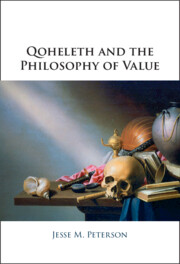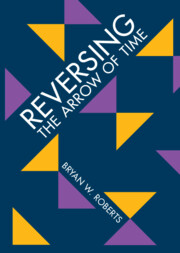Refine search
Actions for selected content:
11 results
Wherever there is AI there is memory: AI as the agency of the (synthesized) past
- Part of
-
- Journal:
- Memory, Mind & Media / Volume 4 / 2025
- Published online by Cambridge University Press:
- 03 September 2025, e12
-
- Article
-
- You have access
- Open access
- HTML
- Export citation

Qoheleth and the Philosophy of Value
-
- Published online:
- 25 June 2025
- Print publication:
- 10 July 2025
1 - Metaphysics
- from Part I - The Block Universe
-
- Book:
- Salvation in the Block Universe
- Published online:
- 09 January 2025
- Print publication:
- 23 January 2025, pp 13-41
-
- Chapter
- Export citation
3 - Shared Habits: Love, Time, and The Magic Mountain in 1925
- from I - Literature and Poetry
-
-
- Book:
- Heidegger and Literary Studies
- Published online:
- 09 November 2023
- Print publication:
- 23 November 2023, pp 51-77
-
- Chapter
- Export citation
2 - What Time Reversal Means
-
- Book:
- Reversing the Arrow of Time
- Published online:
- 24 November 2022
- Print publication:
- 08 December 2022, pp 21-49
-
- Chapter
-
- You have access
- Open access
- Export citation
7 - Time Reversal Violation
-
- Book:
- Reversing the Arrow of Time
- Published online:
- 24 November 2022
- Print publication:
- 08 December 2022, pp 168-191
-
- Chapter
-
- You have access
- Open access
- Export citation
1 - A Brief History of Time Reversal
-
- Book:
- Reversing the Arrow of Time
- Published online:
- 24 November 2022
- Print publication:
- 08 December 2022, pp 1-20
-
- Chapter
-
- You have access
- Open access
- Export citation
6 - There Is No Thermodynamic Arrow
-
- Book:
- Reversing the Arrow of Time
- Published online:
- 24 November 2022
- Print publication:
- 08 December 2022, pp 139-167
-
- Chapter
-
- You have access
- Open access
- Export citation

Reversing the Arrow of Time
-
- Published online:
- 24 November 2022
- Print publication:
- 08 December 2022
-
- Book
-
- You have access
- Open access
- Export citation
Chapter 6 - Epilogue
-
- Book:
- Utopia and the Contemporary British Novel
- Published online:
- 01 July 2019
- Print publication:
- 11 July 2019, pp 197-204
-
- Chapter
- Export citation
An Error in Temporal Error Theory
-
- Journal:
- Journal of the American Philosophical Association / Volume 4 / Issue 1 / Spring 2018
- Published online by Cambridge University Press:
- 06 September 2018, pp. 14-32
-
- Article
- Export citation
